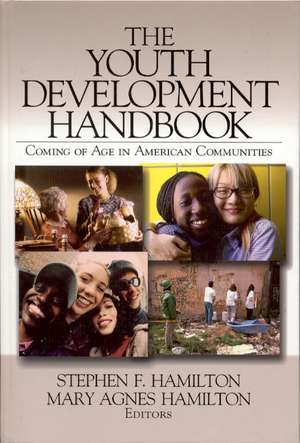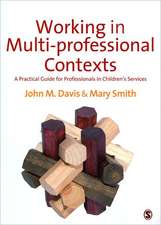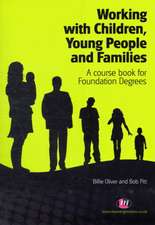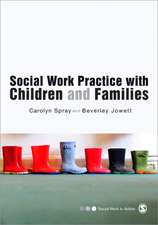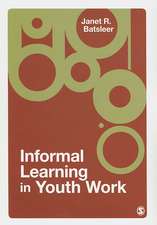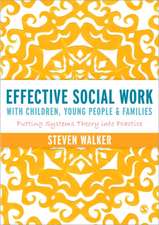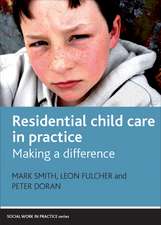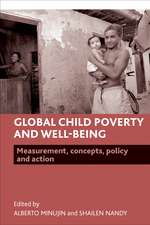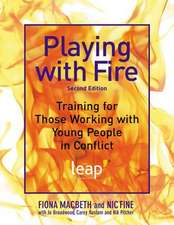The Youth Development Handbook: Coming of Age in American Communities
Editat de Stephen F. Hamilton, Mary Agnes Hamiltonen Limba Engleză Paperback – dec 2003
| Toate formatele și edițiile | Preț | Express |
|---|---|---|
| Paperback (1) | 1096.81 lei 6-8 săpt. | |
| SAGE Publications – dec 2003 | 1096.81 lei 6-8 săpt. | |
| Hardback (1) | 1334.58 lei 6-8 săpt. | |
| SAGE Publications – dec 2003 | 1334.58 lei 6-8 săpt. |
Preț: 1096.81 lei
Preț vechi: 1337.57 lei
-18% Nou
Puncte Express: 1645
Preț estimativ în valută:
209.88€ • 219.57$ • 174.34£
209.88€ • 219.57$ • 174.34£
Carte tipărită la comandă
Livrare economică 03-17 aprilie
Preluare comenzi: 021 569.72.76
Specificații
ISBN-13: 9780761988724
ISBN-10: 0761988726
Pagini: 424
Dimensiuni: 152 x 229 x 22 mm
Greutate: 0.57 kg
Ediția:New.
Editura: SAGE Publications
Colecția Sage Publications, Inc
Locul publicării:Thousand Oaks, United States
ISBN-10: 0761988726
Pagini: 424
Dimensiuni: 152 x 229 x 22 mm
Greutate: 0.57 kg
Ediția:New.
Editura: SAGE Publications
Colecția Sage Publications, Inc
Locul publicării:Thousand Oaks, United States
Recenzii
"In recent years, the fields of psychology and human development have focused growing attention on issues of positive youth development. . . . This volume provides a tool that can be used by researchers, practitioners, and policy makers alike to build collective efforts to enhance the well-being of youth. . . . Professor Hamilton is one of the most respected scholars in the country. There is no doubt in my mind that this volume will not only make a significant contribution in the field, but more important, that it is a volume that will be utilized across disciplines and professions."
"The conceptualization and comprehensiveness are excellent. The book also deals with a newly emerging and exciting field and hence is at the forefront of research, policy, and practice. . . . a useful resource."
"Both timely and potentially very useful…nothing nearly as inclusive as this youth development handbook now exists."
"A handbook like this is a good idea because of the interest in communities and colleges in this topic and because of the number of programs being developed targeted at adolescents. . . . I believe the book will serve as a useful reference for scholars, policy makers, and program development specialists. . . . There are no other comparable resources that focus on exemplary programs and community development issues."
"The conceptualization and comprehensiveness are excellent. The book also deals with a newly emerging and exciting field and hence is at the forefront of research, policy, and practice. . . . a useful resource."
"Both timely and potentially very useful…nothing nearly as inclusive as this youth development handbook now exists."
"A handbook like this is a good idea because of the interest in communities and colleges in this topic and because of the number of programs being developed targeted at adolescents. . . . I believe the book will serve as a useful reference for scholars, policy makers, and program development specialists. . . . There are no other comparable resources that focus on exemplary programs and community development issues."
Cuprins
Foreword
Preface
INTRODUCTION: WHAT IS YOUTH DEVELOPMENT?
1. Principles for Youth Development - Stephen F. Hamilton, Mary Agnes Hamilton (both of Cornell University), & Karen Johnson Pittman (Executive Director, The Forum for Youth Investment)
SECTION ONE: PROCESSES & PRACTICES IN YOUTH DEVELOPMENT CONTEXTS
2. Youth Organizations: From Principles to Practice - Sarah Deschenes (Stanford University), Morva McDonald (University of Maryland), & Milbrey McLaughlin (Stanford University)
3. Organizations Serving All Ages - Geoffrey L. Ream (Cornell University) & Peter A. Witt (Texas A&M University)
4. Bridging Juvenile Justice & Positive Youth Development - William H. Barton (University of Indiana)
5. Youth Development & Health - Richard Kreipe (University of Rochester), Sheryl A. Ryan (University of Rochester & Rochester General Hospital), & Susan Seibold-Simpson (University of Rochester)
6. Can High Schools Foster Youth Development? - Jerome Ziegler (Cornell University)
7. Designing Work & Service for Learning - Mary Agnes Hamilton & Stephen F. Hamilton (both of Cornell University)
8. Using & Building Family Strengths to Promote Youth Development - Catherine P. Bradshaw & James Garbarino (both of Cornell University)
9. Enlisting Peers in Developmental Interventions: Principles & Practices - Michael J. Karcher (University of Texas at San Antonio), Bradford B. Brown (University of Wisconsin-Madison), & Douglas W. Elliott (Cornell University)
10. How Neighborhoods Matter for Youth Development - Ray Swisher & Janis Whitlock (both of Cornell University)
11. Popular Media Culture & the Promise of Critical Media Literacy - Jane D. Brown, Rebecca Schaffer, Lucila Vargas (all of University of North Carolina at Chapel Hill), & LaHoma S. Romocki (Director of Communication, Family Health International)
SECTON TWO: ACTION STEPS
12. Success Factors in Community-wide Initiatives for Youth Development - Kathleen A. Dorgan & Ronald F. Ferguson (Malcolm Wiener Center for Social Policy, JFK School of Government, Harvard University)
13. Understanding & Improving Youth Development Initiatives through Evaluation - Charles V. Izzo, James Connell, Michelle Alberti Gambone, & Catherine P, Bradshaw
14. Understanding the Lay of the Land: Strategies for Funding Youth Development Programs - Glenda Partee (President, American Youth Policy Forum)
15. Implications for Youth Development Practices - Stephen F. Hamilton & Mary Agnes Hamilton (both of Cornell University)
Preface
INTRODUCTION: WHAT IS YOUTH DEVELOPMENT?
1. Principles for Youth Development - Stephen F. Hamilton, Mary Agnes Hamilton (both of Cornell University), & Karen Johnson Pittman (Executive Director, The Forum for Youth Investment)
SECTION ONE: PROCESSES & PRACTICES IN YOUTH DEVELOPMENT CONTEXTS
2. Youth Organizations: From Principles to Practice - Sarah Deschenes (Stanford University), Morva McDonald (University of Maryland), & Milbrey McLaughlin (Stanford University)
3. Organizations Serving All Ages - Geoffrey L. Ream (Cornell University) & Peter A. Witt (Texas A&M University)
4. Bridging Juvenile Justice & Positive Youth Development - William H. Barton (University of Indiana)
5. Youth Development & Health - Richard Kreipe (University of Rochester), Sheryl A. Ryan (University of Rochester & Rochester General Hospital), & Susan Seibold-Simpson (University of Rochester)
6. Can High Schools Foster Youth Development? - Jerome Ziegler (Cornell University)
7. Designing Work & Service for Learning - Mary Agnes Hamilton & Stephen F. Hamilton (both of Cornell University)
8. Using & Building Family Strengths to Promote Youth Development - Catherine P. Bradshaw & James Garbarino (both of Cornell University)
9. Enlisting Peers in Developmental Interventions: Principles & Practices - Michael J. Karcher (University of Texas at San Antonio), Bradford B. Brown (University of Wisconsin-Madison), & Douglas W. Elliott (Cornell University)
10. How Neighborhoods Matter for Youth Development - Ray Swisher & Janis Whitlock (both of Cornell University)
11. Popular Media Culture & the Promise of Critical Media Literacy - Jane D. Brown, Rebecca Schaffer, Lucila Vargas (all of University of North Carolina at Chapel Hill), & LaHoma S. Romocki (Director of Communication, Family Health International)
SECTON TWO: ACTION STEPS
12. Success Factors in Community-wide Initiatives for Youth Development - Kathleen A. Dorgan & Ronald F. Ferguson (Malcolm Wiener Center for Social Policy, JFK School of Government, Harvard University)
13. Understanding & Improving Youth Development Initiatives through Evaluation - Charles V. Izzo, James Connell, Michelle Alberti Gambone, & Catherine P, Bradshaw
14. Understanding the Lay of the Land: Strategies for Funding Youth Development Programs - Glenda Partee (President, American Youth Policy Forum)
15. Implications for Youth Development Practices - Stephen F. Hamilton & Mary Agnes Hamilton (both of Cornell University)
Descriere
What are the types of environments in which youth thrive? How do we cultivate such environments to promote optimal development and positive behavior in youth? The Youth Development Handbook: Coming of Age in American Communities provides youth and development practitioners access to current theory and research in the field of youth development, including illustrations of good practice, original case studies, and a contextual approach to such topics as youth participation and diversity.
The Youth Development Handbook is designed for scholars and researchers in applied developmental science as well as practitioners and policy makers who implement youth development initiatives. The book is also recommended for use in graduate courses on youth development in the fields of Psychology, Human Development & Family Studies, and Education.
The Youth Development Handbook is designed for scholars and researchers in applied developmental science as well as practitioners and policy makers who implement youth development initiatives. The book is also recommended for use in graduate courses on youth development in the fields of Psychology, Human Development & Family Studies, and Education.
